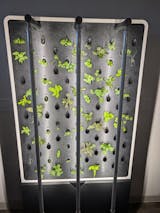This is a co-written blog piece with our friends Alvéole - the urban beekeeping company fostering bee-friendly communities for greener cities across North America and Europe.
--
The COVID-19 pandemic has taught us just how important accessible food is to our communities. Since the beginning of the pandemic, the cost of food has skyrocketed, leaving many citizens at a loss for what to do, proving that many of our cities are food insecure.
With booming populations and waning supply chains, it's clear that local is better. That includes, above all, local and sustainable food systems.
What is a food system?

A food system is the production, distribution, and consumption of food, including all points of the supply chain and retail (Source: Agriculture and Agri-food Canada).
Food security, or more accurately food sovereignty, is people's right to healthy, affordable, and culturally appropriate food that has been produced sustainably. Food Secure Canada defines food security as the goal while food sovereignty presents a way to get there.
The rise of urban agriculture
We are a resilient species. Over the course of the pandemic, many of us began growing our own food – and a whole new wave of urban gardeners was born.
The popularity of urban agriculture, and especially urban gardening, continue to rise as more people discover the benefits of growing their own food. Community gardens are amazing assets and provide so much more than just food. When food is grown locally we eliminate packaging, remove shipping costs and emissions, opt out of pesticides, and create community between neighbors – which is priceless.
There are a range of other environmental benefits of participating in urban agriculture initiatives:
- Green roofs (and really any outdoor garden) help to reduce the heat island effect that we experience in cities and can help cool buildings.
- Gardens help prevent stormwater runoff. With more extreme wet weather events on the horizon, green infrastructure in cities is a must to help mitigate flooding.
- Urban agriculture reduces stress on supply chains and out-of-city producers – reducing both traffic and pollution.
For more on urban agriculture, check out this blog!
The essential role of bees
People aren’t the only ones who benefit from the urban agriculture movement. By growing native plant species, we support a wide array of animals and insects, strengthening local biodiversity. There’s one particular creature who needs our support and who plays an absolutely essential role in our food systems: bees.
Our food systems wouldn’t function without bees. In fact, we can thank bees and other pollinators for one third of everything we eat.
Bees, in turn, need a habitat with diverse and plentiful food sources to survive. As urban centers have expanded, industrial agriculture has had to keep up with the growing demand. This has led to an increase in monoculture, the practice of growing a single crop across large areas of land, eliminating biodiversity. Along with increased pesticide use, much natural pollinator habitat has been wiped out.
By creating urban green spaces and growing your own food, you’re giving bees more food resources and safe habitat. As a thank you, they’ll be sure to pollinate your plants so you can grow the most delicious fruits and veggies!
Keep reading about bees and how you can support them.
How you can get involved
With so many benefits, investing in urban agriculture in our cities should be a no-brainer.
Luckily, there are easy steps anyone can take to contribute to food secure cities, such as:
- Plant a garden – full of veggies and bee-friendly plants.
- Buy local – if you don't have the space for your own garden, support your local farmers and gardeners instead.
- Use your rooftop – rooftop gardening is a great way to use otherwise wasted space and creates ecological corridors through urban centers.
- Volunteer – help out at your local community garden or food center.
We can all play a role in creating sustainable food systems and increasing access to local, affordable, and fresh food!
--
Want to hear more from Alveole? Follow them on Instagram at @alveolebuzz to learn more about the fascinating world of beekeeping and how you can turn your own property into a welcoming home for bees.


